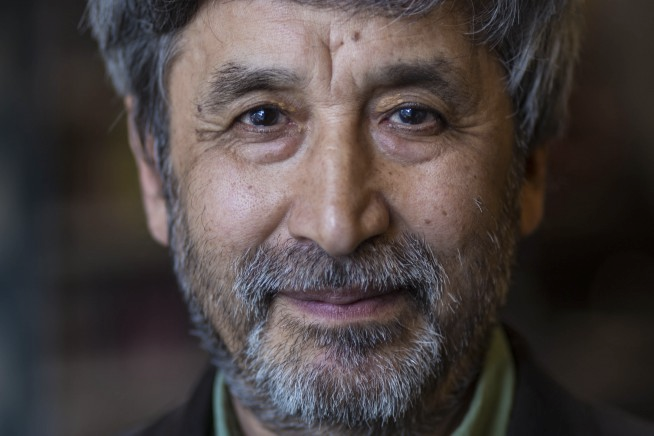04 Apr 18 | Volume 47.01 Spring 2018
[vc_row][vc_column][vc_custom_heading text=”With contributions from Omar Mohammed, Mahvash Sabet, Simon Callow and Lucy Worsley, as well as interviews with Neil Oliver, Barry Humphries and Abbad Yahya”][/vc_column][/vc_row][vc_row][vc_column][vc_column_text]
The spring 2018 issue of Index on Censorship magazine takes a special look at how governments and other powers across the globe are manipulating history for their own ends.
In this issue, we examine the various ways and areas where historical narratives are being changed, including a Q&A with Chinese and Japanese people on what they were taught about the Nanjing massacre at school; the historian known as Mosul Eye gives a special insight into his struggle documenting what Isis were trying to destroy; and Raymond Joseph takes a look at how South Africa’s government is erasing those who fought against apartheid.
The issue features interviews with historians Margaret MacMillan and Neil Oliver, and a piece addressing who really had free speech in the Tudor Court from Lucy Worsley.
[/vc_column_text][/vc_column][/vc_row][vc_row][vc_column][vc_single_image image=”99222″ img_size=”full”][/vc_column][/vc_row][vc_row][vc_column][vc_column_text]
We also take a look at how victims of the Franco regime in Spain may finally be put to rest in Silvia Nortes’ article; Irene Caselli explores how a new law in Colombia making history compulsory in school will be implemented after decades of conflict; and Andrei Aliaksandrau explains how Ukraine and Belarus approach their Soviet past.
The special report includes articles discussing how Turkey is discussing – or not – the Armenian genocide, while Poland passes a law to make talking about the Holocaust in certain ways illegal.
Outside the special report, Barry Humphries aka Dame Edna talks about his new show featuring banned music from the Weimar Republic and comedian Mark Thomas discusses breaking taboos with theatre in a Palestinian refugee camp.
Finally, we have an exclusive short story by author Christie Watson; an extract from Palestinian author Abbad Yahya’s latest book; and a poem from award-winning poet Mahvash Sabet.
[/vc_column_text][/vc_column][vc_column][/vc_column][/vc_row][vc_row][vc_column][vc_custom_heading text=”Special report: The abuse of history “][vc_column_text]
A date (not) to forget, by Louisa Lim: The author on why her book about Tiananmen would be well-nigh impossible to research today
Who controls the past controls the future…, by Sally Gimson: Fall in line or be in the firing line is the message historian are receiving from governments around the world
Another country, by Luka Ostojić: One hundred years after the creation of Yugoslavia, there are few signs it ever existed in Croatia. Why?
No comfort in the truth, by Annemarie Luck: It’s the episode of history Japan would rather forget. Instead comfort women are back in the news
Unleashing the past, by Kaya Genç: Freedom to publish on the World War I massacre of Turkish Armenians is fragile and threatened
Stripsearch, by Martin Rowson: Mister History is here to teach you what really happened
Tracing a not too dissident past, by Irene Caselli: As Cubans prepare for a post-Castro era, a digital museum explores the nation’s rebellious history
Lessons in bias, by Margaret MacMillan, Neil Oliver, Lucy Worsley, Charles van Onselen, Ed Keazor: Leading historians and presenters discuss the black holes of the historical universe
Projecting Poland and its past, by Konstanty Gebert: Poland wants you to talk about the “Polocaust”
Battle lines, by Hannah Leung and Matthew Hernon: One battle, two countries and a whole lot of opinions. We talk to people in China and Japan about what they learnt at school about the Nanjing massacre
The empire strikes back, by Andrei Aliaksandrau: Ukraine and Belarus approach their former Soviet status in opposite ways. Plus Stephen Komarnyckyj on why Ukraine needs to not cherry-pick its past
Staging dissent, by Simon Callow: When a British prime minister was not amused by satire, theatre censorship followed. We revisit plays that riled him, 50 years after the abolition of the state censor
Eye of the storm, by Omar Mohammed: The historian known as Mosul Eye on documenting what Isis were trying to destroy
Desert defenders, by Lucia He: An 1870s battle in Argentina saw the murder of thousands of its indigenous people. But that history is being glossed over by the current government
Buried treasures, by David Anderson: Britain’s historians are struggling to access essential archives. Is this down to government inefficiency or something more sinister?
Masters of none, by Bernt Hagtvet: Post-war Germany sets an example of how history can be “mastered”. Poland and Hungary could learn from it
Naming history’s forgotten fighters, by Raymond Joseph: South Africa’s government is setting out to forget some of the alliance who fought against apartheid. Some of them remain in prison
Colombia’s new history test, by Irene Caselli: A new law is making history compulsory in Colombia’s schools. But with most people affected by decades of conflict, will this topic be too hot to handle?
Breaking from the chains of the past, by Audra Diptee: Recounting Caribbean history accurately is hard when many of the documents have been destroyed
Rebels show royal streak, by Layli Foroudi: Some of the Iranian protesters at recent demonstrations held up photos of the former shah. Why?
Checking the history bubble, by Mark Frary: Historians will have to use social media as an essential tool in future research. How will they decide if its information is unreliable or wrong?
Franco’s ghosts, by Silvia Nortes: Many bodies of those killed under Franco’s regime have yet to be recovered and buried. A new movement is making more information public about the period
[/vc_column_text][/vc_column][/vc_row][vc_row][vc_column][vc_custom_heading text=”Column”][vc_column_text]
Global view, by Jodie Ginsberg: If we don’t support those whose views we dislike as much as those whose views we do, we risk losing free speech for all
[/vc_column_text][/vc_column][/vc_row][vc_row][vc_column][vc_custom_heading text=”In focus”][vc_column_text]
How gags can remove gags, by Tracey Bagshaw: Comedian Mark Thomas discusses the taboos about stand-up he encountered in a refugee camp in Palestine
Behind our silence, by Laura Silvia Battaglia: Refugees feel that they are not allowed to give their views in public in case they upset their new nation, they tell our interviewer
Something wicked this way comes, by Abigail Frymann Rouch: They were banned by the Nazis and now they’re back. An interview with Barry Humphries on his forthcoming Weimar Republic cabaret
Fake news: the global silencer, by Caroline Lees: The term has become a useful weapon in the dictator’s toolkit against the media. Just look at the Philippines
The muzzled truth, by Michael Vatikiotis: The media in south-east Asia face threats from many different angles. It’s hard to report openly, though some try against the odds
Carving out a space for free speech, by Kirsten Han: As journalists in Singapore avoid controversial topics, a new site launches to tackle these
[/vc_column_text][/vc_column][/vc_row][vc_row][vc_column][vc_custom_heading text=”Culture”][vc_column_text]
Just hurting, not speaking, by Christie Watson: Rachael Jolley interviews the author about her forthcoming book, why old people are today’s silent community and introduces a short story written exclusively for the magazine
Ban and backlash create a bestseller, by Abbad Yahya: The bestselling Palestinian author talks to Jemimah Steinfeld about why a joke on Yasser Arafat put his life at risk. Also an extract from his latest book, translated into English for the first time
Ultimate escapism, by Mahvesh Sabet: The award-winning poet speaks to Layli Foroudi about fighting adversity in prison. Plus, a poem of Sabet’s published in English for the first time
[/vc_column_text][/vc_column][/vc_row][vc_row][vc_column][vc_custom_heading text=”Column”][vc_column_text]
Index around the world, by Danyaal Yasin: Research from Mapping Media Freedom details threats against journalists across Europe
[/vc_column_text][/vc_column][/vc_row][vc_row][vc_column][vc_custom_heading text=”Endnote”][vc_column_text]
Frightening state, by Jemimah Steinfeld: States are increasing the use of kidnapping to frighten journalists into not reporting stories
[/vc_column_text][/vc_column][/vc_row][vc_row content_placement=”top”][vc_column width=”1/3″][vc_custom_heading text=”The Abuse of History” font_container=”tag:p|font_size:24|text_align:left” link=”url:https%3A%2F%2Fwww.indexoncensorship.org%2Fnewsite02may%2F2017%2F12%2Fwhat-price-protest%2F%20|||”][vc_column_text]The spring 2018 issue of Index on Censorship magazine takes a special look at how governments and other powers across the globe are manipulating history for their own ends
With: Simon Callow, Louisa Lim, Omar Mohammed [/vc_column_text][/vc_column][vc_column width=”1/3″][vc_single_image image=”99222″ img_size=”medium” alignment=”center” onclick=”custom_link” link=”https://www.indexoncensorship.org/newsite02may/2017/12/what-price-protest/”][/vc_column][vc_column width=”1/3″ css=”.vc_custom_1481888488328{padding-bottom: 50px !important;}”][vc_custom_heading text=”Subscribe” font_container=”tag:p|font_size:24|text_align:left” link=”url:https%3A%2F%2Fwww.indexoncensorship.org%2Fnewsite02may%2Fsubscribe%2F|||”][vc_column_text]In print, online. In your mailbox, on your iPad.
Subscription options from £18 or just £1.49 in the App Store for a digital issue.
Every subscriber helps support Index on Censorship’s projects around the world.
 SUBSCRIBE NOW[/vc_column_text][/vc_column][/vc_row]
SUBSCRIBE NOW[/vc_column_text][/vc_column][/vc_row]
04 Apr 18 | Magazine, Volume 47.01 Spring 2018
Actor
Simon Callow CBE is an English actor, musician, writer, and theatre director, famous for his film roles in Four Weddings and a Funeral (1994), Shakespeare in Love (1998) and A Room with a View (1985).
Journalist
Louisa Lim is an award-winning journalist who has reported from China for a decade, most recently for National Public Radio. Previously she was the BBC’s Beijing Correspondent.
Television presenter
Neil Oliver is a British archaeologist, historian, author and broadcaster who is best known as a presenter of several BBC historical and archaeological documentary series.
04 Apr 18 | Europe and Central Asia, Mapping Media Freedom, Media Freedom, media freedom featured, News and features, Portugal
[vc_row][vc_column][vc_column_text]

The photo that won Enric Vives-Rubio the 2017 Gazeta Award, one of the most prestigious awards in Portuguese journalism.
Despite having worked in Portugal’s small media industry for the past two decades, photojournalists Enric Vives-Rubio and Nuno Fox have never worked in the same newsroom. However, their careers share certain similarities, including poor working conditions, job loss and a reluctant turn of their backs to the profession.
Vives-Rubio got a job at the Portuguese daily Público in November 2005. “It was just the kind of newspaper I hoped I’d work for one day,” he told Mapping Media Freedom.
However, the conditions offered didn’t match Vives-Rubio’s hopes. Instead of proposing to hire him on a regular contract like most of its workers, Público offered to pay him through a “recibo verde”. These “green receipts” are a way for independent or freelance workers to charge companies for their services on an occasional basis, but the system is often abused by Portuguese companies to hire de facto full-time workers without offering them job security or the benefits that come with a full-time contract.
Employers get all the advantages of full-time staff — no obligation to grant job benefits and the possibility to lay off employees with no justification or severance pay due — while the worker is left with no job security and pays nearly twice as much tax as someone on a regular contract.
According to a study by the Union of Journalists, 33.4% of journalists working in Portuguese newsrooms are working without a contract. Although there isn’t a specific number, João Miguel Rodrigues, a photojournalist and a member of the Union of Journalists, says that “many are photojournalists”.
The offer made to Vives-Rubio by Público was hard to resist. “The offer was bad, but I couldn’t say no otherwise I’d be unemployed,” he explained. He was told when he was hired that the green receipt situation was “temporary” and that two months later — come the end of the financial year in 2006 — he would get a proper contract.
“Things didn’t turn out quite like that after all,” Vives-Rubio said.
During the first two years, he’d ask his superiors about his situation on a monthly basis. His insistence got him a contract — although not the one he was looking for — in which he would still work under the green receipt system on an annual basis. This, however, did not grant him any job benefits or job security beyond 365 days.
While all of his colleagues had a €3,000 annual stipend to spend on working material, Vives-Rubio had to pay for his own camera and lenses. He also missed out on food allowance, health insurance, sick days, parental leave and the additional two pay packets per year that full-time workers are entitled to by law.
The situation dragged on until June 2017 when he was called for a meeting with Público. They wanted him to work 15 days per month rather than 22 (a decrease of 32%), and for €1,000 instead of €1,750 (a decrease of 43%).
“They weren’t there to negotiate and were just looking for a way to get rid of a problem,” Vives-Rubio said. Leaving the room without a deal in hand, he resolved to work until the end of his contracted year on 23 July. During this time he was given less assignments while his colleagues were given more. Then, in June, his entrance card stopped working. Público had told a contracted worker who had been going in and out of the building for 12 years that he was barred from entering.
Since he was laid off, Vives-Rubio has received the Gazeta award, one of the most prestigious in Portuguese journalism. However, he doesn’t see a future for him in the media industry anymore. “Photojournalists are all slowly being laid off, so why knock on doors?” he asks. “I’ll keep on making journalism, but it will be for myself. As a photographer, I’ll have to reinvent myself.”
The experience of photojournalist Nuno Fox is similar to that of Vives-Rubio. Ever since he started his career in 2004, he has never had a full-time contract. He started his career at the daily Diário de Notícias before moving to the weekly Expresso, all under the green receipt regime.
“I was hired after there was a layoff in the newspaper and they needed to fill in some positions,” said Fox. He was given a €1,500 monthly salary. “This figure was verbally agreed; there’s no paper trail,” Fox said. “I was a part of the newsroom in every way except I wasn’t properly contracted.”
Fox also used his own camera and lenses too. In one of his last assignments for Expresso, he covered the funeral of Portuguese football legend Eusébio. “It was raining heavily but I had to do my work anyway,” he says. As a result, two of his lenses were damaged. “I thought the newspaper would pay for the damage but they told me it was none of their business. I had to pay €900 to fix one of them and I gave up on the other one because it would have cost me more than €1000 to repair it.”
In 2014, the Impresa media group, to which Expresso belongs, decided to create a pool of photojournalists that would work across all of its titles. Fox wasn’t included and was told his services were no longer needed. “I had no protection against this, so it was an easy choice for them,” he says.
The day after he was laid off, Fox wrote down a list of all publications he was interested in working for, picked up the phone and called their photo editors. “I knew things weren’t easy in journalism, so I decided to go beyond those phone calls,” he says. He also made calls to find work as a commercial photographer. “It was never my intention to go that way, I really believed in journalism, but I was left with no option.”
Three years on, most of Fox’s income now comes through commercial photography. At first, he felt uneasy about turning his back on photojournalism, but is now at peace with this reality. “It’s not that I lost my passion for the job, but I don’t identify with the mindset that values quantity over quality that brought us here.”
Rodrigues underlines that “photojournalists are the most affected by job instability” amongst Portuguese media workers. Those who work with images rather than words deemed less crucial for journalism. “In the eyes of many in newsrooms, photojournalists are looked down on as mere technicians.”
Photojournalists are among the “most versatile” elements in newsrooms and, with increasing pressures, aren’t given enough time to do their jobs properly, Rodrigues says. “When photojournalists are treated like this, the pride they take in their work vanishes and they lose their motivation.”[/vc_column_text][/vc_column][/vc_row][vc_row][vc_column][vc_basic_grid post_type=”post” max_items=”4″ element_width=”6″ grid_id=”vc_gid:1525097962341-ec9d666d-b1a7-9″ taxonomies=”6564″][/vc_column][/vc_row]
04 Apr 18 | Awards, Fellowship 2018, News and features
[vc_row][vc_column][vc_video link=”https://youtu.be/Ev3C9EZqY48″][vc_column_text]Fereshteh Forough is the founder and executive director of Code to Inspire, which opened its first coding school for girls in Afghanistan in November 2015, and aims to address the low levels of female education and paltry levels of economic participation by women in the labour market. 
This is a widely recognised innovative project that helps women and girls learn computer programming. The aim is to tap into the commercial opportunities offered by the online world to liberate women in Afghanistan and offer them economic independence.
Afghanistan is still a male-dominated country where ordinary women find it difficult even to socialise or trave, let alone work, use technology or be economically independent. Women are also discouraged from working where men are present and experience sexual harassment if they do.
Forough believes that with programming skills, an internet connection and using bitcoin for currency, women in Afghanistan can be independent, transform their society and create wealth and economic opportunity.
“Some of the girls had never touched a computer, been online – nothing,” said Forough. “Today, they are able to create web pages and a some are now going out and talking to women-based companies and offering their expertise to them, to help them create websites. This is a real act of resistance in a country where women are still being pushed back for accessing the internet and computers.”
Only 21% of Afghan women receive secondary education according to a UNICEF study and in Afghanistan there is only a 16% female participation in the labour market.
Afghanistan is still economically and politically unstable and parts of it are dangerous and violence-prone, which presents many hurdles to entrepreneurs who want to drive change like Forough, and the women and girls she teaches and helps get jobs.
However Forough is used to challenges. She herself was a refugee. Born to Afghan parents in Iran, she returned to Afghanistan after the fall of the Taliban, and took a position teaching computer sciences at Herat University after studying for a Masters in Germany.

Forough has received support from abroad for Code to Inspire, particularly from the USA with Google, GitHub, but she is still working on a relatively small scale. She needs more support to expand and build her vision round the country franchising the model to other larger cities such as Mazar-e Sharif and Kabul. Forough also wants to organise the first Afghan women hackathon at a national level.
Forough was a 2013 TED Talks speaker and took part in the 2015 Clinton Global Initiative.
In 2017, Code to Inspire enrolled about 20 girls for new graphic and design classes, and later on in the year another group of 60 girls took classes in unity (a gaming software), mobile applications and full stack development.
“It doesn’t matter where you are or what you are, what you have or don’t have,” said Forough. “You should never be afraid to do what you believe in and that’s what Index of Censorship Award means to me, to raise my voice and share my story freely”.
See the full shortlist for Index on Censorship’s Freedom of Expression Awards 2018 here.[/vc_column_text][/vc_column][/vc_row][vc_row full_width=”stretch_row_content” equal_height=”yes” el_class=”text_white” css=”.vc_custom_1490258749071{background-color: #cb3000 !important;}”][vc_column width=”1/2″][vc_custom_heading text=”Support the Index Fellowship.” font_container=”tag:p|font_size:28|text_align:center” use_theme_fonts=”yes” link=”url:https%3A%2F%2Fwww.indexoncensorship.org%2Fnewsite02may%2Fsupport-the-freedom-of-expression-awards%2F|||”][vc_column_text]
By donating to the Freedom of Expression Awards you help us support
individuals and groups at the forefront of tackling censorship.
Find out more
[/vc_column_text][/vc_column][vc_column width=”1/2″ css=”.vc_custom_1521479845471{background-image: url(https://www.indexoncensorship.org/newsite02may/wp-content/uploads/2017/05/2017-awards-fellows-1460×490-2_revised.jpg?id=90090) !important;background-position: center !important;background-repeat: no-repeat !important;background-size: cover !important;}”][/vc_column][/vc_row][vc_row][vc_column][vc_basic_grid post_type=”post” max_items=”4″ element_width=”6″ grid_id=”vc_gid:1523376151785-23b6414e-add3-5″ taxonomies=”10735″][/vc_column][/vc_row]
04 Apr 18 | Media Freedom, media freedom featured, News and features

Read the report here
This post was originally published by the Reporters Committee for Freedom of the Press.
The most perilous place for a journalist in the U.S. last year was at a protest, according to a new report released Tuesday by the Reporters Committee for Freedom of the Press that surveys the 2017 data from the U.S. Press Freedom Tracker. Of the 122 incidents threatening press freedom that the tracker logged last year, nearly half occurred at protests, where journalists faced physical attacks from police and demonstrators, were arrested by law enforcement, and had their equipment seized and, in some cases, searched.
The Reporters Committee and more than two dozen press freedom groups launched the tracker last year to provide “an honest accounting of the country’s record on press freedoms” amid increasing hostility toward the news media. The report, “Press Freedoms in the United States 2017,” is the Reporters Committee’s first annual assessment of the tracker’s data and sheds light on the challenges facing journalists as they work to inform the public and hold those in power accountable.
According to the report, law enforcement officials arrested journalists 34 times, with more than three-quarters of those arrests taking place at protests, where police used a controversial crowd-control technique known as “kettling.” Of the 45 physical attacks on journalists in 2017, two were notably committed by elected officials: Montana congressional candidate Greg Gianforte “body slammed” a reporter who tried to interview him but was nevertheless elected the next day, and an Alaska state senator slapped a reporter in the state capitol building. The tracker also identified instances where journalists were stopped while crossing U.S. borders, denied access to public meetings and information, subpoenaed to testify in court, and subjected to unprecedented verbal attacks from public officials, often at the highest levels of government.
The report also notes that in 2017, the Department of Justice only brought charges in one case involving disclosure of classified information to the media, that of Reality Winner. However, the DOJ has said it is investigating 27 leak cases as of November 2017, and just days ago charged a former FBI agent in Minnesota in connection with a leak investigation, potentially indicating more prosecutions may be forthcoming.
Read the full report here.
03 Apr 18 | News and features, Volume 47.01 Spring 2018
[vc_row][vc_column][vc_custom_heading text=”Women of the Wild West have been omitted from popular history and culture, but they’re finally receiving airtime, writes Jan Fox “][vc_row_inner][vc_column_inner][vc_column_text]

Michelle Dockery stars in Netflix’s Godless, a new show featuring the rarely seen female pioneer, Ursula Coyote/Netflix
[/vc_column_text][/vc_column_inner][/vc_row_inner][/vc_column][/vc_row][vc_row][vc_column][vc_column_text]
Netflix’s new hit show, Godless, is set in a 19th century western USA town run by women. La Belle, New Mexico, has experienced a mining tragedy, killing most of the men and putting women in charge. The cowboys are almost gone and in their place we see women brandishing guns and riding horses.
Godless turns the traditional male-dominated Western genre on its head. It has focused attention on the forgotten women who rolled across the western plains. The storyline may be fictional, but strong pioneer women playing a major part in running these frontier towns is more true to life. But often this side of the history of the west was ignored.
The term “pioneer” refers to anyone who ventured into, and settled, new lands in the USA. Starting in Jamestown, Virginia, in 1607, people moved into the country’s interior and, finally, to the west coast. This history of westward exploration has been told mostly from a male angle. Western landscapes are represented by heroic men on horseback: cowboys, cavalry officers, sharpshooting sheriffs and notorious outlaws.
“In films like Shane and other Westerns, women lack real decision-making authority, and ethnic or racial women appear as prostitutes or bad influences, if they appear at all,” said Laura Woodworth-Ney, executive vice-president and provost of Idaho State University and author of Women and the American West.
It’s definitely a case of his-story, not her-story.
In response to this, the Pioneer Woman Museum in Oklahoma was born.
“I don’t remember learning anything about these women when I was at school in the 1980s, and from the visitors we get at the museum, I don’t think student textbooks are any different today. We need to change that story,” said museum director Kelly Houston. “There were many single and widowed women who went west, but they are largely ignored by history.”
For example, after the Homestead Act of 1862, people raced to claim 160 acres of free public land. Among the biggest of these land races or “runs” in Oklahoma was the one in 1893 when more than 100,000 people showed up.
[/vc_column_text][/vc_column][/vc_row][vc_row][vc_column width=”1/4″][vc_icon icon_fontawesome=”fa fa-quote-left” color=”custom” align=”right” custom_color=”#dd3333″][/vc_column][vc_column width=”3/4″][vc_custom_heading text=”There were many single and widowed women who went west, but they are largely ignored by history” google_fonts=”font_family:Libre%20Baskerville%3Aregular%2Citalic%2C700|font_style:400%20italic%3A400%3Aitalic”][/vc_column][/vc_row][vc_row][vc_column][vc_column_text]
“Widowed or single women could take part if they were over 21. The land runs were extremely competitive and arduous. You had to line up for days, including overnight,” said Houston.
Once a starting gun was fired, people sprinted to a free lot and literally staked a claim. They then had to go to the land registry office to have it signed into their name.
“Not many people realise that women were doing this,” Houston explained.
There were other ways in which pioneer women were key to the development of new towns.
“In Oklahoma, they were the movers and shakers of society, forming clubs and organisations. They are the ones improving school lunches, starting libraries, raising money and so on, and that often gets ignored. They also set up businesses like laundries, shops and cafes,” said Houston.
Something else that gets forgotten is the vital economic role women played in the home.
“In many cases, they were vitally important to their family’s survival through the side-businesses that they ran: raising and selling chickens, making butter, taking in mending. That income could literally save a family in a bad winter if a crop failed,” Houston explained.
A lack of historical sources is a major problem in piecing together a true picture of 19th century pioneer women, explained Woodworth-Ney. “Most working-class women were illiterate at this time, and for many minority women English was not their first language. Apart from that, they would have been too busy working to write anything down. We do have some diaries and letters from lower-middle-class and educated women, including some on the Oregon Trail. In the past 20 years, women historians have been active in shining a light on these, but they are still not readily available.
“They are hard to find because of the cataloguing practices of the late 19th and early 20th centuries when items would have been filed in the archives under the husband’s name and things like diaries and letters would have been filed in the ‘family’ section of his papers and were considered far less important. So this is not so much an intentional type of censorship, but it was hiding these women.”
Elizabeth Gillan Muir, a Toronto-based author and retired lecturer, addresses some of the reasons why pioneer women preachers have been left out of history in her upcoming book, A Women’s History of Christianity. Religion was the cornerstone of life in 19th century USA, and in the great westward expansion more than 100 women preachers travelled to new towns to help “civilise” these unregulated, and often wild, frontier communities.
Although travelling evangelists were perhaps less of a problem than women preaching from the pulpit, men still saw women as a real threat in this situation,” said Muir.
“For the most part, I think why we don’t hear about these pioneer woman preachers is that when they died, their obituaries omitted any reference to preaching activity. Pliny the Elder, writing in the first century AD, said that information about women doctors was intentionally hidden so that, after they died, no one would ever know that they had lived. This is a similar thing, erasing women preachers from history.”
[/vc_column_text][/vc_column][/vc_row][vc_row][vc_column][vc_column_text]
This article is a web special ahead of the launch of the special report in Index on Censorship‘s spring 2018 issue, The Abuse of History, focusing on how history is being manipulated or censored by governments and other powers.
Look out for the new edition in bookshops
Jan Fox is the US contributing editor for Index on Censorship
[/vc_column_text][/vc_column][/vc_row][vc_row][vc_column][vc_custom_heading text=”From the Archives”][vc_row_inner][vc_column_inner width=”1/3″][vc_single_image image=”70877″ img_size=”213×287″ alignment=”center” onclick=”custom_link” link=”http://journals.sagepub.com/doi/pdf/10.1080/03064229108535157″][vc_custom_heading text=”Fear and loathing in San Francisco ” font_container=”tag:p|font_size:24|text_align:left” link=”url:http%3A%2F%2Fjournals.sagepub.com%2Fdoi%2Fpdf%2F10.1080%2F03064229108535157|||”][vc_column_text]July 1991
The law of the gun rules in Cyberspace as it did in the days of America’s ‘Wild West‘, according to American poet and internet activist John Perry Barlow in 1991[/vc_column_text][/vc_column_inner][vc_column_inner width=”1/3″][vc_single_image image=”90649″ img_size=”full” alignment=”center” onclick=”custom_link” link=”http://journals.sagepub.com/doi/pdf/10.1080/03064220008536796″][vc_custom_heading text=”Women as censors” font_container=”tag:p|font_size:24|text_align:left” link=”url:http%3A%2F%2Fjournals.sagepub.com%2Fdoi%2Fpdf%2F10.1177%2F0306422013495334|||”][vc_column_text]September 2000
Mark Kenny looks at how women’s self-censorship has a long, and in most cases, honourable history[/vc_column_text][/vc_column_inner][vc_column_inner width=”1/3″][vc_single_image image=”90965″ img_size=”full” alignment=”center” onclick=”custom_link” link=”http://journals.sagepub.com/doi/pdf/10.1080/03064229308535477″][vc_custom_heading text=”Portrait of a much abused lady” font_container=”tag:p|font_size:24|text_align:left” link=”url:http%3A%2F%2Fjournals.sagepub.com%2Fdoi%2Fpdf%2F10.1177%2F0306422013513103|||”][vc_column_text]January 1993
The politically correct establishment is coopting the feminist discourse to turn it back on the radicals says Marjorie Heins[/vc_column_text][/vc_column_inner][/vc_row_inner][vc_separator][/vc_column][/vc_row][vc_row content_placement=”top”][vc_column width=”1/3″][vc_custom_heading text=”The abuse of history” font_container=”tag:p|font_size:24|text_align:left” link=”url:https%3A%2F%2Fwww.indexoncensorship.org%2Fnewsite02may%2F2018%2F04%2Fthe-abuse-of-history%2F|||”][vc_column_text]The spring 2018 issue of Index on Censorship magazine takes a special look at how governments and other powers across the globe are manipulating history for their own ends
With: Simon Callow, David Anderson, Omar Mohammed [/vc_column_text][/vc_column][vc_column width=”1/3″][vc_single_image image=”99282″ img_size=”medium” alignment=”center” onclick=”custom_link” link=”https://www.indexoncensorship.org/newsite02may/2018/04/the-abuse-of-history/”][/vc_column][vc_column width=”1/3″ css=”.vc_custom_1481888488328{padding-bottom: 50px !important;}”][vc_custom_heading text=”Subscribe” font_container=”tag:p|font_size:24|text_align:left” link=”url:https%3A%2F%2Fwww.indexoncensorship.org%2Fnewsite02may%2Fsubscribe%2F|||”][vc_column_text]In print, online. In your mailbox, on your iPad.
Subscription options from £18 or just £1.49 in the App Store for a digital issue.
Every subscriber helps support Index on Censorship’s projects around the world.
 SUBSCRIBE NOW[/vc_column_text][/vc_column][/vc_row]
SUBSCRIBE NOW[/vc_column_text][/vc_column][/vc_row]
03 Apr 18 | Awards, Fellowship 2018, News and features
[vc_row][vc_column][vc_video link=”https://youtu.be/1Tgkm4m3W7c”][vc_column_text]The Digital Rights Foundation based in Pakistan have been nominated for its work on a cyber-harassment helpline which was set up a year ago and has supported more than a thousand women.
It is the first service of its kind in Pakistan and helps women report cyber-harassment regardless of where they live in the country. The helpline is important because it is an innovative and practical way of challenging women’s exclusion from online spaces and bolstering women’s rights to freedom of expression.
DRF was founded by digital rights activist Nighat Dad. As well as the helpline, the organisation provides training for women in online harassment, carries out advocacy work for a safe internet and raises awareness of digital security and censorship issues.
“Digital Rights Foundation envisions a place where all people, and especially women, are able to exercise their right of expression without being threatened,” said DRF. “We believe that free internet with access to information and impeccable privacy policies can encourage such a healthy and productive environment that would eventually help not only women, but the world at large”.
The impetus behind the helpline was the murder last summer of the Pakistani social media celebrity Qandeel Baloch who had a million followers and lived in a small provincial town in Punjab.
She was killed by her brother for her sexually confident posts on Facebook, posts which would be normal in Western countries. In small town conservative Pakistani society, dominated by religious leaders they caused outrage.
While Baloch’s was an extreme case, women online – who make up only 20 to 25% of the online population – routinely face bullying including revenge porn, blackmail, impersonation, non-consensual usage of personal information, privacy violations and other kinds of harassment. Women are afraid to report how badly they are treated and so react by withdrawing from online spaces.
This silencing of female voices and the exclusion of women from social media and other sites, which mirrors the exclusion of women from public spaces and public life generally in Pakistan, is a significant threat to freedom of expression.
 The support team includes a qualified psychologist, digital security expert, and trained lawyer, all of whom provide specialised assistance. The helpline helps women, children, human rights defenders, minority communities and anyone who might feel unsafe in digital spaces. It receives around 80 calls a month, and 60% of the requests for help are from women. Quite a few are also from men seeking advice on behalf of women.
The support team includes a qualified psychologist, digital security expert, and trained lawyer, all of whom provide specialised assistance. The helpline helps women, children, human rights defenders, minority communities and anyone who might feel unsafe in digital spaces. It receives around 80 calls a month, and 60% of the requests for help are from women. Quite a few are also from men seeking advice on behalf of women.
Staff ensure victims can make official reports of harassment to the authorities. As law enforcement offices where victims can file a complaint are only located in provincial capitals, it can be extremely difficult for victims in more remote parts of the country to initiate an investigation. To address this, the helpline has its own legal officer who can pursue cases on behalf of victims.
The helpline team produce reports every six months, which include an analysis of the kind of issues callers ring in about, and recommendations for action by Pakistani institutions responsible for online safety to make sure that women’s voices are heard.
“We at Digital Rights Foundation are honoured to be nominated for the Index on Censorship Freedom of Expression Awards.” said DRF. “The recognition means a great deal to us especially given the shrinking spaces for activists both online and offline. The Award will go a long way in lending legitimacy to our work and will amplify our dissent in favour of a free and safe internet”.
See the full shortlist for Index on Censorship’s Freedom of Expression Awards 2018 here.[/vc_column_text][/vc_column][/vc_row][vc_row full_width=”stretch_row_content” equal_height=”yes” el_class=”text_white” css=”.vc_custom_1490258749071{background-color: #cb3000 !important;}”][vc_column width=”1/2″][vc_custom_heading text=”Support the Index Fellowship.” font_container=”tag:p|font_size:28|text_align:center” use_theme_fonts=”yes” link=”url:https%3A%2F%2Fwww.indexoncensorship.org%2Fnewsite02may%2Fsupport-the-freedom-of-expression-awards%2F|||”][vc_column_text]
By donating to the Freedom of Expression Awards you help us support
individuals and groups at the forefront of tackling censorship.
Find out more
[/vc_column_text][/vc_column][vc_column width=”1/2″ css=”.vc_custom_1521479845471{background-image: url(https://www.indexoncensorship.org/newsite02may/wp-content/uploads/2017/05/2017-awards-fellows-1460×490-2_revised.jpg?id=90090) !important;background-position: center !important;background-repeat: no-repeat !important;background-size: cover !important;}”][/vc_column][/vc_row][vc_row][vc_column][vc_basic_grid post_type=”post” max_items=”4″ element_width=”6″ grid_id=”vc_gid:1522917764760-5edc93c3-6e5f-7″ taxonomies=”10735″][/vc_column][/vc_row]
03 Apr 18 | Awards, China, Digital Freedom, Fellowship, Fellowship 2016, News and features
[vc_row][vc_column][vc_video link=”https://youtu.be/aT1dO5oekso”][vc_column_text]

GreatFire are the 2016 Digital Activism Fellow
In a speech given this past February at an invitation-only Index event, Index 2016 Digital Awards Fellow GreatFire asked the audience whether “the global internet is bringing free speech, or is China bringing censorship to the global internet?”
Trying to do its part in bringing free speech to Chinese internet users, the anonymous nonprofit recently launched its Patreon crowdfunding campaign on March 30.
In the wake of the March National People’s Congress, which swept away presidential term limits, and Apple’s deal to have state-owned enterprise Guizhou-Cloud Big Data (GCBD) host its data, the fight against Chinese censorship is facing an uncertain future.
“Xi Jinping wants to make sure that all criticism, at home and abroad, can be silenced,” said Charlie Smith, GreatFire co-founder.
Apple is helping Xi Jinping and the Communist Party do just that, according to Smith. In the February speech, GreatFire said, “China’s Communist Party has surprised everyone by becoming experts at censorship technology.”
Smith wouldn’t be surprised if “Apple shared private user information about Apple customers outside of China with the Chinese authorities, in cases where those users may be ‘stirring up trouble’ against China.”
GreatFire’s February speech also cited that “when pressured by a letter from two US senators last year, Apple admitted to having censored more than 700 apps just in the VPN category.”
“Apple is working hand-in-hand with the Chinese authorities to implement censorship, not just in China, but around the world,” said Smith. “At the moment, this mainly affects Chinese [customers] but the writing is on the wall – all Apple customers will soon find that it will become increasingly more difficult and perhaps impossible to access negative information about the ruling Communist Party and party officials.”
However, Smith hopes other big-name companies like Google will re-enter China’s market without having to censor and not follow Apple’s footsteps. In 2010, Google shut down its operations after Chinese human-rights activists had their Gmails hacked, and the company has yet to come back.
“Google has the technical know-how, the expertise and the money to be able to offer an uncensored version of its search engine to an audience in China,” said Smith. “Google has the power to offer a 100% uncensored service to China’s 700 million plus internet users. If we can do it, they can do it.”
[/vc_column_text][vc_row_inner][vc_column_inner width=”1/4″][vc_single_image image=”98218″ img_size=”medium” onclick=”custom_link” link=”https://www.indexoncensorship.org/newsite02may/2018/03/amazing-banned-memes-china/”][/vc_column_inner][vc_column_inner width=”3/4″][vc_column_text]
[/vc_column_text][/vc_column_inner][/vc_row_inner][vc_row_inner][vc_column_inner width=”1/4″][vc_single_image image=”85698″ img_size=”medium” onclick=”custom_link” link=”https://www.indexoncensorship.org/newsite02may/2017/02/six-sites-blocked-by-chinas-great-firewall”][/vc_column_inner][vc_column_inner width=”3/4″][vc_column_text]
[/vc_column_text][/vc_column_inner][/vc_row_inner][vc_column_text]The February speech also noted that following Google’s departure, “the vast majority of Chinese internet users exclusively use domestic services that are completely controlled by the Communist Party.”
If Google were to re-enter the market without censoring itself, it would destroy “a firewall that is preventing more than 700 million people from freely accessing information [and] would be the most important development in the history since the development of the internet itself,” said Smith.
Unlike his optimism for Google, Smith wishes China had lost Apple to Chinese censorship instead of it mixing its business with GCBD.
“Apple will likely not share transparency reports about requests that the Chinese authorities are making for private information,” said Smith. “People who get detained by the authorities for ‘stirring up trouble,’ which is a common, catch-all description for those who express their displeasure about anything related to the Communist Party, may not even know that they ended up in detention because Apple shared their private information with the authorities.”
With the stage set for the 2022 Winter Olympics in Beijing, journalists, tourists and athletes will be hitting China’s Great Firewall “if companies and individuals do not stand up to [China’s] censorship,” said Smith, adding that “the situation will only get worse.”
Unable to fund its operations directly from Chinese users because of official intimidation, GreatFire’s Patreon launch looks to individuals for financial help, hopefully shifting itself away from reliance on funding organisations.
Because “most internet freedom funding is for shiny new things,” GreatFire is utilizing Patreon to fund its ongoing projects and not new ones, said Smith. Patreon, a member-subscription platform to generate funds for content creators, will allow GreatFire to maintain its existing sites and continue to combat China’s Great Firewall.[/vc_column_text][/vc_column][/vc_row][vc_row][vc_column][vc_basic_grid post_type=”post” max_items=”4″ element_width=”6″ grid_id=”vc_gid:1522746056610-05bb1437-96d7-5″ taxonomies=”8199″][/vc_column][/vc_row]
02 Apr 18 | Index in the Press
PEN America and 32 other prominent arts organizations have come together to jointly file a friend of the court brief in the case of State of Hawaii v. Trump, urging the Supreme Court to strike down the third iteration of the Trump travel ban issued on September 27, 2017. Read the full article.
30 Mar 18 | Index in the Press
As the promoter of the We are Funny Project, the biggest open mic comedy network in London, I have experienced a very rocky last few weeks, veering between depression and elation.
Read the full article.
30 Mar 18 | Index in the Press
Seventeen international press freedom groups have called on Turkish authorities to immediately release 12 printing plant workers and staff arrested on March 28 at the office and printing plant of the Özgürlükçü Demokrasi newspaper and an additional 15 employees taken into custody in raids on their homes on the morning of March 29. Read the full article.
29 Mar 18 | Global Journalist (Arabic), Journalism Toolbox Arabic
[vc_row][vc_column][vc_custom_heading text=”حميد إسماعيلوف هو صحافي وكاتب أوزبكي اضطر إلى الفرار من أوزبكستان في عام ١٩٩٢ بسبب ما وصفته الدولة “بميول ديمقراطية غير مقبولة“.” font_container=”tag:h2|text_align:right”][vc_row_inner][vc_column_inner][vc_column_text]
 [/vc_column_text][/vc_column_inner][/vc_row_inner][/vc_column][/vc_row][vc_row][vc_column][vc_column_text]
[/vc_column_text][/vc_column_inner][/vc_row_inner][/vc_column][/vc_row][vc_row][vc_column][vc_column_text]
رغم كل شيء، لا يزال عبد العزيز محمد الصبري يبتسم. لكنه لا يستطيع ان لا يشعر بالاكتئاب عندما يرى الصور التي التقطت له قبل بضعة أشهر، والتي يظهر فيها وهو يحمل عدسة كاميراته أو يقوم بتثبيت كاميرا فيديو على حاملها الثلاثي القوائم: “لقد صادرها الحوثيون مني. صادروا كل المعدات التي كنت أملكها. حتى لو أردت الاستمرار في العمل، فلن أكون قادرا على ذلك”، يقول صبري.
صبري هو صحافيّ ومخرج ومصوّر يمني من تعز، المدينة التي شكّلت لفترة وجيزة الجبهة الأكثر دموية في الحرب الاهلية الدائرة في البلاد. وقد عمل صبري في أخطر النقاط الساخنة، حيث قام بتزويد وسائل الإعلام الدولية مثل رويترز و سكاي نيوز بالمواد الصحفية والصور الأصلية من جبهات القتال. “لقد أحببت دائما العمل في الحقل”، يقول صبري، ويضيف: “لقد قمت بعمل جيّد ومثمر حقّا منذ بداية ثورة 2011 “.
منذ بداية الحرب، تدهورت بيئة عمل الصحفيين اليمنيين بشكل مضطرد. على سبيل المثال، خضع الصحفي المخضرم يحيى عبد الرقيب الجبيحي لمحاكمة مغلقة حكمت عليه بالإعدام بعد أن نشر مقالات تنتقد المتمرّدين الحوثيين في اليمن. وقد اختفى العديد من الصحفيين أو تم اعتقالهم، وأغلقت وسائل إعلام عديدة، في خلال السنوات القليلة الماضية.
بحسب صبري، “يواجه قطاع الإعلام وأولئك (الصحفيون) الذين يعملون في اليمن آلة حرب تقوم بسدّ كل الأبواب في وجوهنا، فهي تسيطر على جميع المكاتب المحلية والدولية لوسائل الإعلام. طالت الهجمات والاعتداءات ضدنا 80 بالمئة من الأشخاص الذين يعملون في هذه المهن، من دون أن نشمل الصحفيين الذين قتلوا، كما سجّلت 160 حالة اعتداء وهجوم واختطاف مختلفة. واضطر العديد من الصحافيين إلى مغادرة البلاد للنفاذ بحياتهم مثل صديقي العزيز حمدان البكري الذي كان يعمل لقناة الجزيرة في تعز “.
حميد إسماعيلوف يستحق اعتذارًا. أو على أقل تقدير ، تفسيرا.
لقد مرت ٢٦ سنة على الأحداث التي أجبرت الصحفي الأوزبكي حامد إسماعيلوف على مغادرة وطنه أوزبكستان والفرار إلى المملكة المتحدة. في التسعينيات ، كان إسماعيلوف يعمل مع طاقم تلفزيون هيئة الإذاعة البريطانية لصنع فيلم عن أوزبكستان لكن النظام القمعي للرئيس إسلام كريموف فتح قضية جنائية ضد إسماعيلوف بعد أن ادّعت السلطات إن إسماعيلوف يحاول إسقاط الحكومة.
أصدقاء إسماعيلوف نصحوه بالهروب من أوزبكستان بعد صدور تهديدات ضد عائلته وحدوث هجمات على منزله وهذا ما فعله. بعد أربع وعشرين عامًا ، ما زال لم يعد الى وطنه.
لكن هذا لا يعني أنه لم يحاول العودة. فلقد حاول إسماعيلوف العودة عدة مرات آخرها في العام الماضي بعد وفاة كريموف في عام ٢٠١٦ ولكنه تم منعه من الدخول.
على الرغم من أن إسماعيلوف هو أحد أكثر الكتّاب الأوزبكيين شهرة في العالم ، فان كتبه لا تزال محظورة في بلده الأصلي. لا يتم التسامح مع أي ذكر لاسماعيلوف وقد تم محو وجوده أساسا من الحياة الثقافية اليومية في وطنه. ومع ذلك ، فانه في عصر الإنترنت ، وجد إسماعيلوف طرقًا للوصول إلى الجمهور الأوزبكي من خلال مواقع التواصل الاجتماعي فنشرت بعض رواياته على فيسبوك حيث يستطيع الأوزبك قراءتها.
وفقا لمؤشر حرية الصحافة لمنظمة مراسلون بلا حدود ، تحتل أوزبكستان المرتبة ١٦٩ من بين ١٨٠ دولة. مع التحكم الصارم في وسائل الإعلام التقليدية ، بدأ اهتمام الحكومة في الآونة الأخيرة ينصب على اتخاذ إجراءات صارمة ضد مواقع الأخبار المستقلة وتطبيقات الرسائل الفورية.
بعد وفاة كريموف في عام ٢٠١٦ ، تولى رئيس الوزراء شوكت ميرزيوييف السلطة. في ٢آذار / مارس ٢٠١٨ ، أفرجت أوزبكستان عن الصحفي يوسف روزيمرادوف، الصحفي الذي أمضى أطول وقت في السجن في العالم بعد أن سُجن لأكثر من ١٩ عامًا. وأعرب إسماعيلوف عن سعادته بنبأ إطلاق سراح روزيمرادوف ، لكنه لا تزال لديه الكثير من الشكوك اذ يقول: “بقدر ما أنا متفائل ، فأنا متشكك أيضاً”.
خلال اقامته في المنفى في المملكة المتحدة ، عمل إسماعيلوف في الخدمة الدولية بهيئة الإذاعة البريطانية بي بي سي. في أيار/ مايو ٢٠١٠ ، تم تعيين إسماعيلوف ككاتب مقيم في بي بي سي، وهو المنصب الذي شغله حتى نهاية عام ٢٠١٤. يشغل إسماعيلوف حاليًا منصب رئيس تحرير شؤون آسيا الوسطى في هيئة الإذاعة البريطانية.
تحدث حميد إسماعيلوف إلى سيدني كالش من مجلّة “اندكس أون سنسرشب” (مؤشر الرقابة) عن حالة حقوق الإنسان في أوزبكستان ووقته في المنفى وكتابه المترجم حديثا “رقصة الشيطان”. فيما يلي النص المحرّر للمقابلة:
اندكس أون سنسرشب: ماذا كان وضع حقوق الإنسان في أوزبكستان قبل مغادرتك وكيف تغير الوضع على مدار الـ ٢٣ عامًا الماضية؟
إسماعيلوف: للأسف تدهور الوضع على مر السنين بسبب النظام الاستبدادي للرئيس كريموف ، الذي كان في السلطة في ذلك الوقت وتوفي في عام ٢٠١٦. لذا خلال كامل هذه الفترة كان وضع حقوق الإنسان سيء جدا في أوزبكستان. كانت أوزبكستان دائما في المراتب الدنيا في سجلات حقوق الإنسان في العالم. لذا ، في أيامنا هذه مع الرئيس الجديد ، فإن طريقة تصرف شرفات ميرزيوييف تجعلنا نأمل في أن يتحسن الوضع مع حقوق الإنسان لأن العديد من السجناء السياسيين تم إطلاق سراحهم. تم اطلاق بعض الأنشطة وأصبحت الصحافة أكثر نشاطًا وانفتاحًا. هناك بصيص من الأمل في أن الأمور سوف تتحسن. لكن في نفس الوقت – اذا نظرنا الى بلدان أخرى حيث قام زعماء جدد بالتظاهر في البداية بأنهم إصلاحيين ولكنهم عادوا إلى سياسات الحكام السابقين – فأنا أيضا متشكك بعض الشيء. بقدر ما أنا متفائل ، أنا متشكك أيضا.
اندكس أون سنسرشب: لقد حاولت العودة إلى أوزباكستان في العام الماضي وتم منعك ، فهل تعتقد أنك سترى بلدك مرة أخرى؟
إسماعيلوف: نعم ، كان ذلك من المؤسف اذ أنه حتى في ظل السلطات السابقة حاولت مرتين دخول أوزبكستان بعد أحداث أنديجان في عام ٢٠٠٥ ، لكن النظام الجديد لم يسمح لي بدخول البلاد. شكّل ذلك لي صدمة. أعتقد أنهم مدينون لي باعتذار حول السبب الذي لم يسمحوا لي من أجله بالدخول إلى بلدي. أنا واحد من الكتاب المعروفين جيدا في الغرب وجميع أنحاء العالم الذين يروجون للأدب الأوزبكي ، وربما أكثر من أي شخص آخر. فلماذا لم يُسمح لي بدخول البلاد؟ أحتاج إلى شرح واعتذار على الأقل قبل أن أقرر ماذا أفعل بعد ذلك.
اندكس أون سنسرشب: وقد شعرت بهذه الطريقة في كل مرة يتم فيها رفض دخولك ، أي أنت تشعر فقط أنك تحتاج إلى اعتذار؟
إسماعيلوف: أعتقد ذلك. أنا لم ارتكب أي جرائم ضد أوزبكستان. لم أفعل أي شيء يضر بأوزبكستان. كل ما أقوم به هو الترويج للأدب والثقافة من أوزبكستان في جميع أنحاء العالم. لذلك ، شعرت بالصدمة والقلق بسبب عدم السماح لي بالدخول إلى أوزبكستان. إنه المكان الذي يعيش فيه جميع أقاربي ، وأنا كنت أخطط للذهاب إلى قبر والدتي. لكن عندما خططت لكل شيء ، فجأة ، طُردت من المطار.
اندكس أون سنسرشب: أنت لم تعش في البلد منذ عام ١٩٩٢ ، ولكنك لا تزال تنشر باللغة الأوزبكية. هل يعني هذا أنك ما زلت تكتب من أجل الجمهور الأوزبكي ، وليس الجمهور الغربي؟
إسماعيلوف: أكتب بلغات مختلفة. أنا أكتب باللغة الأوزبكية. وأنا أكتب باللغة الروسية. أنا أكتب باللغة الإنجليزية كذلك. أي (أنا أكتب بـ) لغات مختلفة للجماهير المختلفة. إذا كنت أكتب بالأوزبكية ، فمن الأرجح أن يكون ذلك موّجها للأوزبك، اذ ليس هناك الكثير من الأشخاص الإنجليز أو الروس الذين يقرؤون باللغة الأوزبكية. الترجمات مفيدة لي كثيرا بسبب الحظر المفروض على كتبي في أوزبكستان. ولكن في عصر الإنترنت ، لا يشكل الحظر أهمية كبيرة لأنني ما زلت أستطيع نشر عملي على الويب. شيء آخر هو أن الناس يخافون من ذكري أو التحدث عن أعمالي لأنهم يعرفون عواقب ذلك. ومع ذلك ، فإن الإنترنت تجعل حياتي أسهل بكثير.
اندكس أون سنسرشب: كتابك الجديد ، رقصة الشيطان، على وشك أن يصدر في المملكة المتحدة باللغة الإنجليزية ، ما هو موضوع الكتاب؟
إسماعيلوف: في الحقيقة رقصة الشيطان ليس كتابًا جديدًا. فأنا انتهيت منه في عام ٢٠١٢ ثم نشرته باللغة الأوزبكية على فيسبوك. انتشر بشكل واسع جدا في ذلك الوقت. يبدو جديدًا لأنه تم ترجمته إلى الإنجليزية. في الحقيقة ، لقد كتبت ثلاث روايات بعد ذلك ، وقد أنهيت رواية بالإنجليزية أيضا. “رقصة الشيطان” هي قصة الكاتب الأيقوني ، عبد الله قادري، الكاتب الأوزبكي العظيم من القرن العشرين ، الذي أراد كتابة رواية من شأنها أن تنسخ كل ما كتبه من قبل وتحل محله. نحن نعلم ما الذي كان من المفترض أن تدور حوله هذه الرواية ، لكن في الوقت الذي بدأ فيه في كتابة هذه الرواية ، تم اعتقاله. بعد عشرة أشهر ، في عام ١٩٣٨ ، اعدم بالرصاص في سجون ستالين. روايتي تدور حول أيام قادري في السجن وكيف يقوم بالتفكير في روايته الشهيرة التي لم تكتب. هناك روايتان داخل رواية واحدة فلقد تجرأت على كتابة رواية نيابة عنه. تظهر هذه الرواية في عقله لذا فهي ليست مكتوبة مئة في المئة ولكن هناك مسودات تقريبية ، وهناك قصص ، وهناك نوايا وأفكار. انها رواية مكتوبة وغير مكتوبة في الوقت نفسه.
اندكس أون سنسرشب: كيف أثّر الوقت الذي أمضيته ككاتب مقيم في هيئة الإذاعة البريطانية عليك كصحفي؟
إسماعيلوف: لقد كان ممتعاً ولكن في نفس الوقت شعرت بمسؤولية كبيرة لأنني كنت أمثل هذه المجموعة العظيمة من الكتاب مثل جورج أورويل ، وف. س. نايبول وغيرهم. كنت أشعر وكأنني تجسيد لهؤلاء الناس. كنت أحاول أن أعرض ما تعنيه الكتابة للمنظمة ، ما الذي يعنيه الإبداع لهذه المنظمة.
اندكس أون سنسرشب: ما هو الجزء الأصعب في كونك صحفي في المنفى؟
إسماعيلوف: الجزء الأصعب هو عدم التواجد مع شعبك على أساس يومي. على الرغم من أنك تقابلهم بشكل يومي افتراضيا ولكنك لا تراهم وجهًا لوجه ، وهذا هو الجزء الأصعب. لكن هناك أشياء ايجابية في المنفى رغم ذلك، مثل أن تبدأ بالنظر إلى الجزء الخاص بك من العالم أو بلدك بمنظور أوسع. يمكنك رؤية منظور بلدك في العالم. يمكنك مقارنة تجارب بلدك بأجزاء أخرى من العالم ويمكنك أن تأتي بتجارب أو تجارب مماثلة لبلدان أخرى الى عالمك. لذلك هناك إيجابيات وسلبيات.
اندكس أون سنسرشب: كيف تعتقد أن تقاريرك الصحفية قد تغيرت منذ أن كنت في المنفى؟
إسماعيلوف: أعتقد أن الصحافة في الاتحاد السوفياتي السابق كانت مفاهيمية للغاية. أي أنها كانت تتمحور حول المفاهيم والمخططات الكبيرة بدلاً من القصص البشرية. صحافة الـ بي.بي.سي تركّز أكثر على القصص الإنسانية ، أي أنت تقارب الواقع من خلال القصص الإنسانية والتجارب البشرية. كان هذا هو الفرق الأكثر إثارة للانتباه وكانت تجربة مذهلة بالنسبة لي. أنا ككاتب ، أتعامل مع قصصي دائمًا من خلال تجارب شخصياتي وهذا كان يشبه جدًا مقاربة الصحافة الغربية. لذلك، تحقق لدي الانسجام في العمل الصحفي هنا. ككاتب ، أنت تقارب الأشياء من خلال الشخصيات ، كصحفي هنا أنت تفعل الشيء نفسه.
اندكس أون سنسرشب: لقد ذكرت مرة أن بعض الناس يشعرون أكثر ارتباطًا بثقافة بلدهم الأصلي وأكثر فخرًا بثقافتهم بعد مغادرة بلدهم ، هل تشعر بهذه الطريقة حول ثقافة أوزبكستان؟
إسماعيلوف: نعم ، أنا أشعر كذلك. نعم ، أشعر بالمسؤولية عن ثقافتي لأنني عندما أفكر في أجدادي ، عن جداتي وعن بلدي وعن عمّاتي، وعن جميع الأشخاص الذين كانت مشاركتهم في ثقافتي كبيرة جدًا – أشعر أنه يجب أن أعطي شيئًا بالمقابل إلى هذه الثقافة التي جعلتني ما أنا عليه اليوم. لكن في الوقت نفسه ، أشعر بأنني جزء من ثقافات مختلفة ، من الثقافة الروسية ، من الثقافة الإنجليزية أيضًا ، بعد أن عشت في لندن على مدار ٢٤ عامًا الماضية. لم أعش أبدا في مكان واحد لفترة طويلة كهذه. لذا ، أنا أشيد بهذا البلد وأنا مدين لهذا البلد. أكتب عدة روايات باللغة الإنجليزية كتحية لهذا البلد ولهذه الثقافة.
قد تكون أوزبكستان مدينة لأسماعيلوف بالشكر اذن.
[/vc_column_text][/vc_column][/vc_row]

![]() SUBSCRIBE NOW[/vc_column_text][/vc_column][/vc_row]
SUBSCRIBE NOW[/vc_column_text][/vc_column][/vc_row]








 The support team includes a qualified psychologist, digital security expert, and trained lawyer, all of whom provide specialised assistance. The helpline helps women, children, human rights defenders, minority communities and anyone who might feel unsafe in digital spaces. It receives around 80 calls a month, and 60% of the requests for help are from women. Quite a few are also from men seeking advice on behalf of women.
The support team includes a qualified psychologist, digital security expert, and trained lawyer, all of whom provide specialised assistance. The helpline helps women, children, human rights defenders, minority communities and anyone who might feel unsafe in digital spaces. It receives around 80 calls a month, and 60% of the requests for help are from women. Quite a few are also from men seeking advice on behalf of women.
 [/vc_column_text][/vc_column_inner][/vc_row_inner][/vc_column][/vc_row][vc_row][vc_column][vc_column_text]
[/vc_column_text][/vc_column_inner][/vc_row_inner][/vc_column][/vc_row][vc_row][vc_column][vc_column_text]